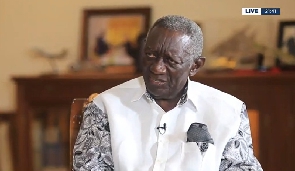Religion of Tuesday, 19 February 2013
Source: Mensah, Richard Obeng
How and when to be protected from enemies
Trust in the LORD, and do good… - Psalm 37:3(NKJV)
Phocas was a fourth century Christian who lived outside the city of Sinope. He was highly hospitable to travelers. Many travelers enjoyed refreshment and baby rest in his garden. Phocas always took the opportunity to share his faith with all such travelers. Despite his great generosity, one emperor Diocletian ordered that all Christians should be killed. And Phocas of Sinope was high on the list some magistrates issued. Interestingly, when the officers of the magistrates arrived at Sinope, hot and weary from a long day’s journey, they naturally enjoyed the refreshment in Phocas’s garden. Shockingly, when Phocas asked them of their mission he was told they had been ordered to execute a local Christian called Phocas. “I know him well,” Phocas said. “He doesn’t live far away at all. Why don’t you…rest for the night, and I will direct you to him in the morning.” During the night, Phocas dug a hole, in the garden he loved, large enough to take a human body. At dawn he woke the Roman soldiers and told them he was Phocas. Bishop Asterious, narrator of this story, recounts the astonishment of the men and their insistence that they could not put to death a man who had been so kind to them.
What was Phocas’s response? “Oh, please do,” he said. “I am a Christian, death is not important to me; whereas if you do not fulfill your orders you will get into trouble. Think of yourselves. You must do your duty. It will not alter my love and affection for you.” So Phocas was accordingly executed, and his body was gently lowered into the garden grave. Indeed “[a] love that had given so much to all passing travelers had no more to give; it had given all” – Ian Barclay in his Living and Enjoying the Fruit of the Spirit. Phocas’s story illustrates real love, the ability to love enemies, the unlovely and the unattractive. He aptly followed Jesus’s example.
There are many lessons to draw from the examples of Jesus and Phocas. Firstly, we need not fret because of our enemies. We should rather take their presence as an opportunity to do good to them. Secondly, we should always put our trust in God and dare the consequences. We must also commit our lives and ways to the God. But we should leave the results to Him. God always acts justly in everything; so even if He does not ‘deliver’ us, it will ultimately work out for our good. Although Phocas was eventually executed, he is no doubt an epitome of real love. Thirdly, always endeavour to depend on God entirely and keep His way (commandments) – love!
Do we have to always behave in the way Phocas did? Certainly not! “Love does not delight in evil.” This means that it does not revel when others grovel. Love thus does not glee in injustice. James Riddle wrote, “Even though we are to love our enemies, sometimes we need to protect ourselves from them. That means that there are times when we should pray that they are even taken out of our way. That goes for enemies in this natural world as well as our spiritual world.” In addition, we should always endeavour to bring wicked people to justice. Truly, there are times when extreme measures are to be taken for the greater good. For instance, “if an enemy threatens your family, you must protect your family first.” And protect the masses as well. Love is wise.
Richard Obeng Mensah, author of Persecutions are Promotions.
Email: richardobengmensah@gmail.com. Blog: www.richard-obeng-mensah.blogspot.com












